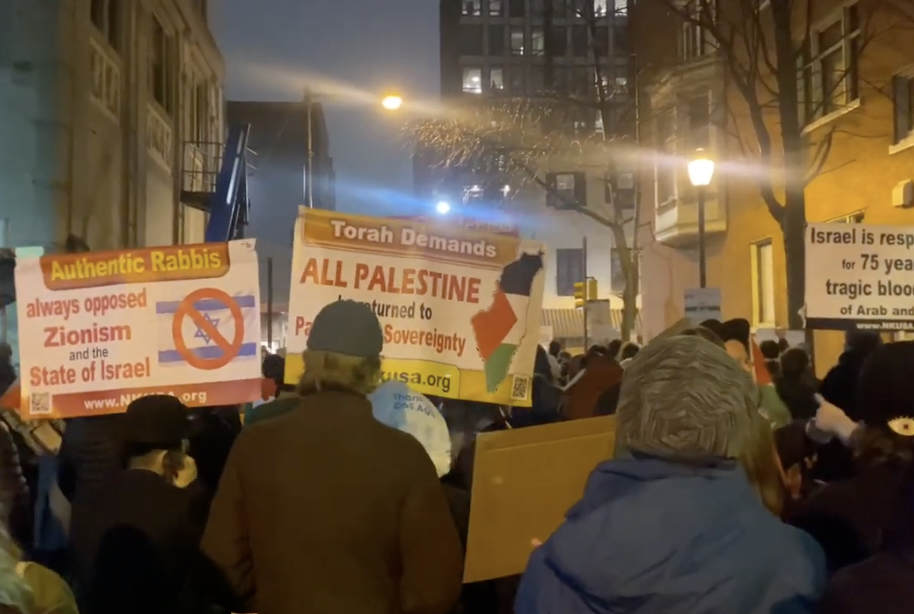Philadelphia is a diverse city known as the birthplace of America. Despite these accolades, Philadelphia is unfortunately still not immune from the rising antisemitism that we’ve seen grow across the nation following the October 7 Hamas terrorist attack against Israel.
It’s time that we, as Philadelphians, face that fact head-on.
Less than a week after Hamas’s atrocities against Israeli civilians, the Philly Palestine Coalition released a statement that not only expressed solidarity with Hamas, but also asserted that “Israel is solely responsible” for the barbarity of October 7. Their embrace of victim-blaming would shock the conscience even if it were limited to Israelis – but it isn’t.
Recent protests organized by the Coalition in Center City made it clear that they hold American Jews just as responsible for Israeli military policy. Agitators vandalized a Jewish after-school center for children ages 5-12, and chanted accusations of genocide at an Israeli restaurant in what Governor Shapiro called “a blatant act of antisemitism”. Even the name of the protest, “Flood Philly for Gaza,” evoked Hamas’s name for its terrorist onslaught: “Al-Aqsa Flood”.
Many of the protesters were the same age as the Israeli civilians who were assaulted and murdered by Hamas on October 7. This did not seem to provoke empathy; in fact, Students for Justice in Palestine chapters at the University of Pennsylvania, Temple, Drexel, Swarthmore, Bryn Mawr, and Haverford all belong to the Coalition.
Hamas’s founding document lays out its vision for a Jew-free world, and its spokesmen have repeatedly issued calls for genocide, yet the Coalition refers to Israel as “a genocidal death machine… founded on blood and sustained through blood.”
As our Philadelphia neighbors, who cannot plead ignorance, cheered on antisemitic terrorism, how should we respond?
It cannot be with indifference, which Elie Wiesel called “the opposite of love”.
Makom Community, the vandalized Jewish after-school center, set an example with its response. Rather than ignoring the incident or shrinking into a defensive posture, they proudly covered the graffiti with a sign wishing passers-by a Happy Hanukkah and encouraging them to “let your light shine.”
Philadelphia’s annual Hanukkah celebration proceeded as scheduled, albeit with increased security.
A December 10 rally at Congregation Rodeph Shalom also showcased the power of solidarity and resilience. Speakers decried antisemitic incidents from campuses to downtown – but it was by no means a pessimistic event. Presenter after presenter emphasized the importance of positive, forward-thinking action.
Bipartisan legislators promised to support antisemitism education. Students applauded the dismissal of UPenn president Liz Magill after her failure to denounce calls to antisemitic genocide. Rabbi Eli Freedman punctuated the evening by asserting that the event’s message was one of hope and compassion, not hate or vengeance.
For Jews, the stakes of this moment go far beyond the vandalism that emerged from the Philly Palestine Coalition protests. As FBI Director Christopher Wray testified before Congress, Jews make up only 2.4 percent of the US population, yet are the victims of about 60 percent of all religious-based hate crimes.
Jews have been persecuted for millennia, and we can’t pass this latest wave of hate off as an aberration that will subside on its own. Our response, both as a Philly community and as a nation, should mirror the responses above. Antisemitism must be clearly identified, condemned, and addressed with an eye toward the long term.
Accepting that whatever you may think of Israel’s government, Israel’s civilians did not deserve the violence they were subjected to is a necessary first step for anyone interested in building a diverse and welcoming community.
I look forward to a time when hate will not blind people to fundamental moral truths. Until then, happy holidays.

